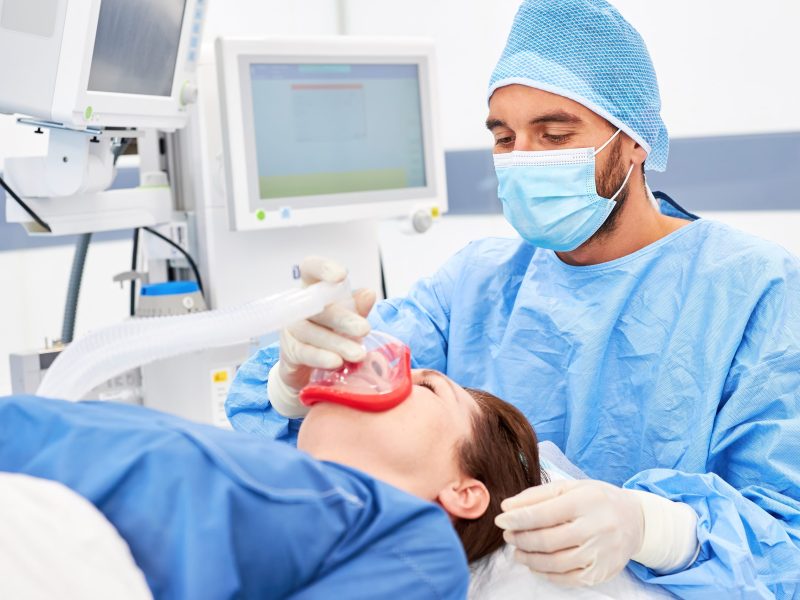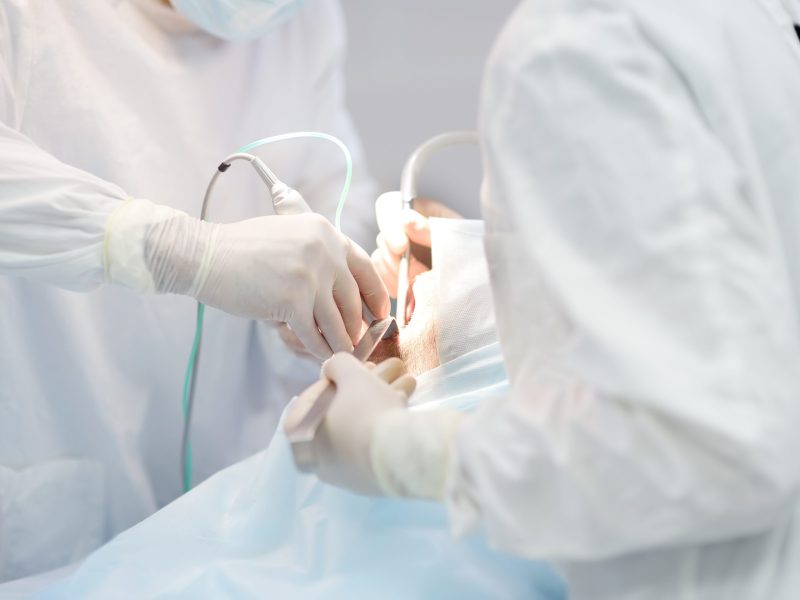How Safe is General Anaesthesia?
Understanding how general anaesthesia works can make you feel more comfortable if you or someone close to you needs dental surgery. Dentists often use it to make sure you’re relaxed and free from pain during the procedure. Today, our Brisbane dentist will talk about the safety of general anaesthesia in dentistry, how it works, and what you should expect before, during, and after your dental visit. This way, you’ll know exactly what’s happening and can feel prepared and at ease.
What is General Anaesthesia?
General anaesthesia is a type of medication that dentists and doctors use to make sure you’re completely asleep during a procedure. It’s really helpful because it means you won’t feel any pain or even be aware of what’s happening while the dentist works. This allows them to perform procedures that might otherwise be uncomfortable or too difficult if you were awake.
When you receive general anaesthesia, you’re in a deep sleep with no dreams. You simply sleep through the procedure and wake up when it’s all done. This is especially important for longer or more complex dental treatments, where staying still and calm is necessary for the best results. Your dentist ensures everything is done safely and smoothly, letting you rest without any worry.

How Does General Anaesthesia Work?
General anaesthesia works by temporarily affecting your brain and body so you don’t feel pain or have any awareness during dental treatment. Think of it as a switch that turns off your senses and helps you enter a state where you won’t respond to what’s happening around you. This ensures that you can have a dental procedure done without any discomfort or memory of the process.
The medication used for general anaesthesia is administered by a specially trained professional, usually an anaesthesiologist or a dental anaesthetist. They use a combination of gases that you breathe in through a mask or injectable drugs that go into a vein.
Once these medications start working, they slow down the activity in your brain and block the signals that tell your body to feel pain. This is why you stay asleep and pain-free throughout the procedure. The anaesthesia team continuously monitors your heart rate, breathing, and other vital signs to keep you safe until the treatment is over and you gradually wake up.
When is General Anaesthesia Needed?
General anaesthesia is only used in certain cases to make sure the patient feels comfortable, and the dental procedure goes smoothly. Here are some scenarios where general anaesthesia might be necessary:
Complex Procedures
For extensive or invasive dental surgeries, where the patient must stay completely still, general anaesthesia provides the deep sedation needed. This includes certain types of oral surgery or cases where multiple procedures are done in one visit.
High Anxiety
If a patient has severe dental anxiety that prevents them from undergoing treatment while awake, general anaesthesia can help by rendering them unconscious, thus eliminating the stress and discomfort associated with the procedure.
Special Cases
Some patients, such as those with severe gag reflexes or special needs, might require general anaesthesia to tolerate any form of dental treatment. This ensures that they can receive necessary care without distress or complications.
Paediatric and Special Needs Patients
Children who cannot cooperate due to age, behaviour, or certain medical conditions and adults with special needs who cannot understand or follow instructions benefit from general anaesthesia to receive pain-free and safe dental care. Your child’s Brisbane paediatric dentist will assess your child’s health and needs to ensure the safest and most effective treatment plan.
In every case, the decision to use general anaesthesia involves a detailed assessment of the patient’s medical history, the complexity of the required dental work, and the patient’s comfort and safety preferences.
Dentists and trained anaesthesiologists take several precautions, including pre-procedure consultations and continuous monitoring during the procedure, to ensure safety and minimise any risks associated with anaesthesia.

Is General Anaesthesia Safe?
General anaesthesia is considered very safe when administered by trained professionals. The overall safety of general anaesthesia has improved significantly over the years, making serious complications rare. Here’s a concise breakdown of its safety, supported by current research:
- Safety and Risks: General anaesthesia is safe for most patients. The mortality rate associated with its use in medically fit and healthy individuals is extremely low, approximately 0.0005% or 1 in 200,000.
- Advancements in Safety: Technological advancements and improved training protocols have greatly enhanced the safety of administering general anaesthesia. These include better monitoring systems that help anesthesiologists adjust dosages in real time and more effective post-operative care strategies.
- Risk Factors: While general anaesthesia is safe for the majority, certain individuals, such as older adults, those with serious medical conditions, or individuals undergoing extensive procedures, may face higher risks. These risks can include confusion post-surgery or, more rarely, events like stroke or heart attack, particularly in those with existing health issues.
What Are the Possible Risks?
Understanding the potential risks associated with general anaesthesia is important, even though serious complications are uncommon. Here’s a simple breakdown to help you know what to expect:
Common Side Effects: These are usually mild and clear up soon after the procedure. They include:
- Nausea or vomiting
- Drowsiness or feeling groggy
- A sore throat, often from the breathing tube used during surgery
- Mild shivering or feeling cold
- Dry mouth or mild hoarseness when speaking
Rare but Serious Risks: While these are not common, it’s good to be aware of them:
- Allergic reactions to anaesthetic agents can range from mild skin rashes to severe reactions affecting breathing or heart function.
- Breathing difficulties during or after anaesthesia, especially in those with existing lung issues.
- Heart problems such as irregular heartbeats or, very rarely, a heart attack during or after the procedure.
- Anaesthesia awareness, where a patient might become conscious during surgery, is extremely rare but can be distressing.
Each of these risks is carefully managed by the medical team, who use monitoring equipment and safety protocols to minimise any complications. Remember, your doctor and anaesthetist are there to make sure you are as safe and comfortable as possible before, during, and after your procedure.
How Do Dentists Make Sure You’re Safe?
Dentists and anaesthesiologists follow strict protocols to ensure your safety during dental procedures that require general anaesthesia. Here’s how they keep you safe:
- Vital Signs Monitoring: Throughout the procedure, your medical team will continuously monitor your vital signs. This includes checking your heart rate, blood pressure, oxygen levels, and breathing. These checks help ensure everything is normal as the anaesthesia is administered and throughout your treatment.
- Specialist Training: Anaesthesiologists are medical doctors who have undergone extensive training specifically to administer anaesthesia safely and manage any complications. Their expertise is crucial, especially in accurately dosing and adjusting anaesthesia during your procedure.
- Safety Equipment: Modern dental clinics are equipped with advanced safety equipment. This includes monitoring devices, emergency medication, and tools to manage airways and breathing. All these are set up and checked before your procedure begins.
- Team Coordination: Your safety is a team effort. Alongside the anaesthesiologist, the entire dental team is trained to respond to various scenarios under anaesthesia. They work together to ensure that the procedure goes smoothly and safely.
Who is at Greater Risk?
When considering general anaesthesia for dental procedures, it’s important to know that certain individuals might face a higher risk of complications. Here’s how dentists ensure everyone’s safety, especially those who are at greater risk:
- Older Adults: As we age, our bodies can react differently to medications, including anaesthesia. Older patients might have a slower recovery and are more susceptible to certain complications, such as confusion or heart problems after anaesthesia.
- People with Health Conditions: Individuals with underlying health conditions such as heart disease, lung disorders, diabetes, or obesity are also at greater risk. These conditions may affect how the body handles anaesthesia and recovery.
- Those with Allergies or Previous Reactions to Anaesthesia: If you’ve had a reaction to anaesthesia in the past or if you have specific drug allergies, it’s crucial to inform your dentist and anaesthesiologist.
- Smokers and Heavy Alcohol Users: Smoking and heavy alcohol use can increase the risk of respiratory problems during and after anaesthesia.
Before any procedure requiring anaesthesia, your dentist will conduct a thorough health assessment. This might include reviewing your medical history and current medications and possibly performing some tests to ensure that you’re fit for anaesthesia. This proactive approach helps to tailor the anaesthetic plan to your specific needs, reducing the risk of complications.
What to Expect Before, During, and After General Anaesthesia
When you’re scheduled for a dental procedure requiring general anaesthesia, it’s natural to have questions about what to expect before, during, and after the anaesthesia. Here’s a straightforward guide to make things clearer and help ease any concerns:
Before Anaesthesia
- Medical Review: Your dentist or anaesthesiologist will discuss your health in detail to ensure that general anaesthesia is safe for you.
- Fasting: You will be instructed not to eat or drink anything, usually from midnight the night before your procedure. This prevents risks associated with vomiting during anaesthesia.
- Preparation: You may need to stop taking certain medications and will also be asked about any allergies to ensure there are no adverse reactions during the procedure.
During Anaesthesia
- Administration: General anaesthesia is typically administered through an IV line in your arm. Sometimes, it may be started with a gas that you breathe from a mask.
- Monitoring: Throughout the procedure, your vital signs, including heart rate, oxygen levels, and blood pressure, will be closely monitored to maintain your safety.
- Comfort: The goal is to keep you completely unconscious and free from pain during the dental surgery.
After Anaesthesia
- Waking Up: You will wake up in the recovery area, where your recovery process is closely monitored to ensure you’re responding well as the anaesthesia wears off.
- Side Effects: It’s common to feel groggy, confused, or even nauseous as you recover. These effects usually wear off within hours.
- Going Home: Most patients can go home the same day, but you’ll need someone to drive you as you shouldn’t operate vehicles or make important decisions for at least 24 hours.
How Can You Prepare for General Anaesthesia?
Preparing for a procedure involving general anaesthesia can make a big difference in both the success of the procedure and your comfort. Here are some practical steps to ensure you’re ready:
- Discuss Your Health History: Inform your doctor about your medical conditions, past surgeries, and any problems you or your family members have had with anaesthesia.
- Medication Review: Bring a list of all medications you’re taking, including over-the-counter drugs and supplements. Your doctor might ask you to stop taking certain medicines before the surgery.
- Follow Fasting Instructions: You’ll likely need to fast (no food or drink) for several hours before the procedure. Your doctor will give you specific instructions based on the time of your surgery.
- Arrange Transportation: Due to the lingering effects of anaesthesia, you won’t be able to drive after the procedure, so plan for a friend or family member to take you home.
- Prepare at Home: Prepare a comfortable recovery area at home with essentials, such as water, medications, and comfortable pillows, within easy reach.
What Should You Tell Your Doctor Before Anaesthesia?
- Medications and Allergies: It’s crucial to be open about any allergies to medications or substances, and your current medications, as these can affect how anaesthesia affects you.
- Previous Reactions to Anaesthesia: If you’ve had issues with anaesthesia in the past, even minor ones, let your doctor know.
- Lifestyle Habits: Smoking, alcohol consumption, and recreational drug use can affect anaesthesia. Be honest for your safety.
- Health Changes: If there have been any recent changes in your health, share these with your doctor to avoid complications.